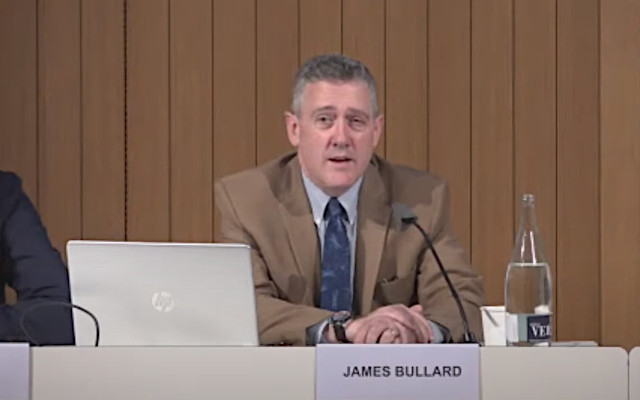research
Inflation and Interest Rates in the time of COVID and War

Kickstart of the AXA-BSE Talks with James Bullard and “Inflation and Interest Rates in the time of COVID and War”
The first AXA-BSE Talks on the Economy: “Inflation and Interest Rates in the time of COVID and War” took place on June 20 in the Ateneu Barcelonès, an event that was also streamed. James Bullard, President and CEO of the Federal Reserve Bank of St. Louis, and member of the Federal Open Market Committee (FOMC), was the keynote speaker, joined by discussants Gilles Moëc, Chief Economist at AXA and Chiara Osbat, Economics Adviser at the European Central Bank. The session was moderated and presented by Albert Marcet (ICREA-CREI, BSE), AXA Chair on Macroeconomic Risk.
The talk focused around inflation and interest rates in connection with the pandemic, and encompassed numerous related subjects, including policy considerations, and notably the comparison of the current situation with the scenario in the 1970s and 1980s. Presenting the event, Marcet reflected on the timeliness of the talk: only days before the US Federal Reserve Bank had announced a 0.75 % increase in interest rates.
Talk and ensuing discussion:
Bullard started, “we really have higher inflation compared with what we had in recent years.” In contrast, according to pre-pandemic economic data, at the start of 2020 the prospects were good: “people were pretty happy, the economy was growing, labor markets were strong, inflation was low, and inflation rates were set for that.”
James Bullard talking at the 1st AXA-BSE Talks event.
At present, said Bullard, US inflation levels are comparable to those seen in the 1970s and 1980s, with inflation far above target, something also being seen in Europe. The main risk, he said, is “that inflation expectations become unmoored,” if credible action from the Fed is not taken. Market rates have already increased substantially, he said, in part as a result of promised Fed action. Meanwhile, the labor market in the U.S. remained robust and is expected to continue expanding in 2022.
The Fed has already reacted, said Bullard: “we’ve raised the policy rate, we’ve promised to raise the policy rate still further, we have begun passive balance sheet reduction and we’ve also had forward guidance on all of these dimensions, and the guidance is already reflected in market pricing.”
Chiara Osbat raised the matter of rents in connection with inflation, mentioning that “rents and items affected by supply distributions contribute more to core inflation in the Euro Area than in the US.” Osbat also raised that “while the Euro Area labor market has accelerated, it is far from the tightness seen in the US.” Still in connection to the labor market, she added that European job retention schemes were posing problems for interpreting the usual indicators of wage growth.
With regard to inflation, Osbat asked whether there is reason to worry that it could become more persistent due to wage price spirals: “Is the situation now different from the 1970s, when there was no clear monetary policy framework?” Bullard reflected that “while wages are very much related to the prices in the economy,” he considered that “wage spirals are a symptom of bad monetary policy, not a driver of inflation.” Success stories of inflation targeting suggest that “if you hold the central bank accountable to hit 2% inflation, you are going to get 2%.”
Gilles Moëc raised the subject of excess income created during the pandemic, much higher in the US than in the Euro Area and whether this will continue to accelerate. He added, “is calibration of monetary policy even harder than usual?” The exceptionality of pandemics makes indeed calibration more difficult, said Bullard, but when deciding the intensity, time and extent of the actions to be taken, “it is not clear how much is going to be enough,” and the spirit in the US has been “if anything, to overdo it.”
Moëc also raised concerns regarding the possibility that “the increase in funding conditions is a bit too fast, a bit too strong.” Another thought addressed the cost of the fight against climate change could become a structural long-term inflationary factor in the years ahead, a matter whose relevance acknowledged Bullard, however indicating that opposite examples of long transitions exist, such as in medical care inflation or technology price deflation.
A final round of questions included a remark by Marcet recalling that indeed “central banks have more credibility than they did in the 1970s,” but that “the European Central Bank’s task is much harder because it needs to deal with each different country,” however adding that having different monetary policies for each country would generate a lot of uncertainty. Bullard quoted from the literature that “if you have a lot of credibility and you make an announcement, then expectations adjust immediately to the new situation and inflation goes away quickly without much in terms of real resource cost,” stressing once again the importance of working on the credibility of central banks for them to remain effective in their mission.
About the AXA-BSE Talks series
The AXA-BSE Talks are sponsored by the AXA Research Fund, established to address the most important issues facing our planet, funding research in key areas related to risk and helping inform public and private decision making based on science. The series is organized by the AXA-BSE Chair on Macroeconomic Risk, and is designed for a wide audience, including students and BSE alumni. In the AXA-BSE Talks, policy makers, economics researchers, and business leaders will discuss relevant policy issues related to macroeconomic risk.

